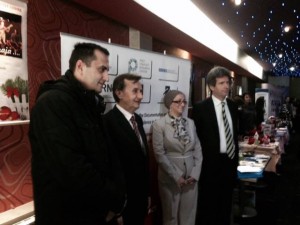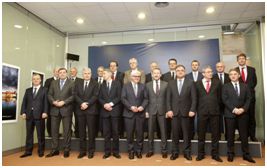6th March 2015
WOMEN, PEACE AND SECURITY
I am, of course, at an immediate disadvantage in writing a blog about the role and representation of women in politics and society on the inescapable basis that I am not one. But I am a son, a brother, a husband, a father and a colleague to strong, creative and clever women, and that leaves me in no doubt at all that any society in which women are under-represented is a society that is unbalanced and ineffectual.
Sunday is 8th March, the 105th International Women’s Day. In a perfect world, that would mean that 8th March would be a day for celebrating the amazing contribution of women to society. And so it is. But, at the same time, more than 100 years on it should be a matter of sadness and disappointment that International Women’s Day is also still, necessarily, about protecting, promoting and supporting one half of the human population. All too often, women remain marginalised or even endangered within their communities.
Here in Bosnia and Herzegovina, the British Embassy continues to work closely with women who often suffered disproportionately during the terrible events of the 1990s. In particular, we remain committed to supporting victims of sexual violence in conflict – men, as well as women – who all too often have been denied justice, and who lack proper support either from the government or in some cases from their own families and communities.
Thank heaven, this country has come a long way in the last twenty years, and we all hope and believe that such events belong to the past and could never happen again. But one way of the surest ways to cement peace and stability in this country and in the wider region is to improve the representation of women in politics. It is precisely for this reason that, fifteen years ago, UN Security Council Resolution 1325 urged Member States to ensure increased representation of women at all decision-making levels in national, regional and international institutions and mechanisms for the prevention, management and resolution of conflict.
In January, the British and German Foreign Secretaries visited Sarajevo in order to press for socio-economic reforms that should create new opportunities for the citizens of this country and advance Bosnia and Herzegovina along its path towards the European Union. During that visit, they met with the leaders of the 14 major political parties. The picture says everything that needs to be said about the representation of women in decision-making roles in this country. With a few important exceptions – amongst them, RS Prime Minister Cvijanović, Deputy Speaker of the BiH Parliament Krišto, Vice President of the Federation Mahmutbegović and Presidents Kreso and Galić of the Constitutional and State Courts – they are all too few.
This year is the 20th anniversary of the Beijing Platform for Action in which the world’s governments agreed to a minimum quota of 30% women in positions at decision-making levels. It is clear that we collectively remain well short even of that modest target. While some important steps have been taken here, including the legislative requirement that at least 40% of electoral candidates should be women, it would be great to see more of them in Ministerial positions and party leadership roles. I’ve certainly met lots and lots of impressive women in Bosnia and Herzegovina – not least amongst our Embassy Fellows – who could help to transform the political and economic fortunes of this country. You can read about some of them here.
This isn’t an easy transition for any country, including my own. It seems to take a long time to reverse centuries of male hegemony and domination. In some parts of the world, like Iraq and Syria, dark forces continue to use violence and intimidation to suppress and silence women. I can’t think of a better reason to work for the total equality of women and girls. #HeForShe


And yet the reality is that the bones of the women of Vilina Vlas have been abandoned to the past, along with truth and justice.
It’s quite important to fight for equality. No matter the society, the government, the religion, it’s essential to manifest the same amount of respect for all genders. It may seem something utopian, but one day maybe we’ll live to see it.
Your Excellency, I would hereby like to thank you for thoughtful comment and care and attention that British Embassy is paying to various issues of women suffering in BiH. I think your campaign to help women victims of sexual violence in conflict is highly commendable and the one I hope to raise awareness of the public. Unfortunately, we did not start the reconciliation process hence twenty years on in BiH we still face resentment and abhorrence. As you well observed we do have insignificant representation of women in politics however their role in the politics does not serve credit to women. They do not have their own opinion and they do not express it as well as they serve as mere pawns of their male political leaders. The role as such is hurting women in BiH even more and makes us faceless and subordinate.